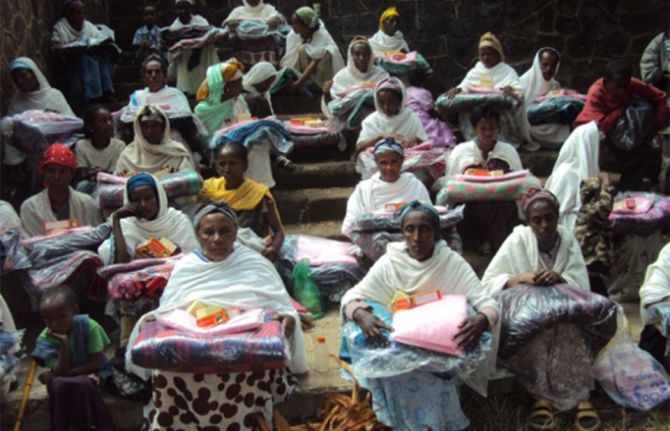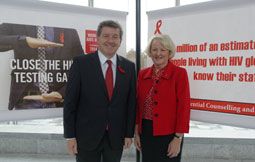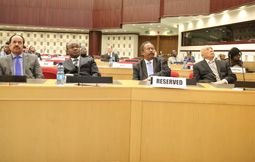
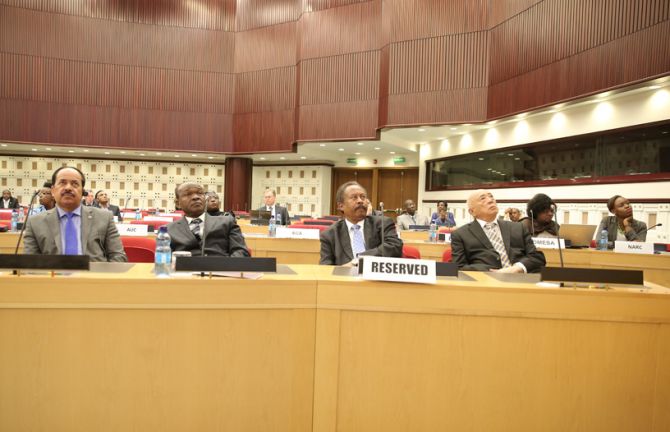
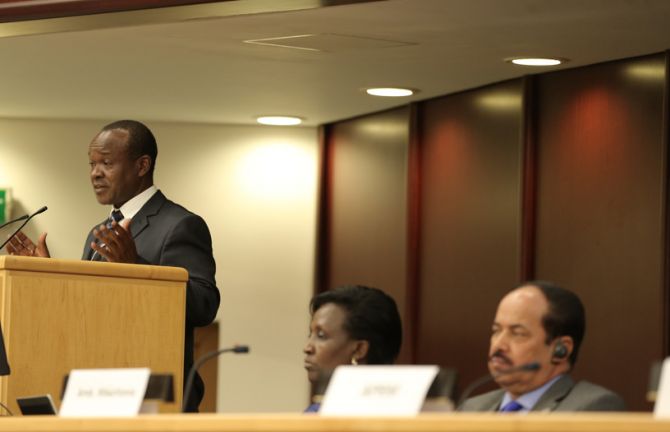
Update
Leaders call for an African road map to end the AIDS epidemic by 2030
27 November 2014
27 November 2014 27 November 2014Leaders of key continental, regional and national institutions concluded that the AIDS epidemic remains a key priority for Africa and must be ended by 2030 in the continent during a High-level Dialogue on Ending AIDS, held on 24 November in Addis Ababa, Ethiopia. The dialogue was hosted by the African Union Commission, the United Nations Economic Commission for Africa and UNAIDS as part of activities to commemorate World AIDS Day 2014.
During the meeting, participants discussed the recommendations in the new UNAIDS report Fast-Track: ending the AIDS epidemic by 2030 and encouraged countries to embrace the targets set to end the AIDS epidemic by 2030. To achieve this goal, participants made several recommendations, which include ensuring the effective use of existing continental accountability mechanisms, such as AIDS Watch Africa and the African Peer Review Mechanism; focusing on innovative ways of increasing domestic financing for health; ensuring sustained access to medicines through local production of drugs; integrating AIDS as part of broader health and development; and ensuring national HIV programmes tailored for young people and populations at higher risk of HIV infection.
Participants of the meeting included ambassadors of African Union Member States, representatives of the African Union Commission, regional economic communities, the African Peer Review Mechanism, AIDS Watch Africa, civil society organizations and development partners, and key opinion leaders, academics and young people.
Quotes
“Ending AIDS is Africa’s responsibility, everyone’s responsibility and indeed a global responsibility.”
“The battle against HIV and AIDS is ours to win.”
“The African Peer Review Mechanism not only assesses and monitors the extent to which commitments are implemented, it also provides the opportunity for policy-makers and ordinary citizens to hold each other accountable.”
“We must step up our efforts in the AIDS response—there must be no room for complacency.”
“We, the youth movement, ask our leaders to walk away from this dialogue with these commitments—action towards adopting targets for universal sexual and reproductive health and rights, and ending the AIDS epidemic by 2030 in the post-2015 development agenda.”
“The commitment to end the AIDS epidemic is already there. What we now need is a clear strategy to achieve this ambitious target.”
Region/country
Related

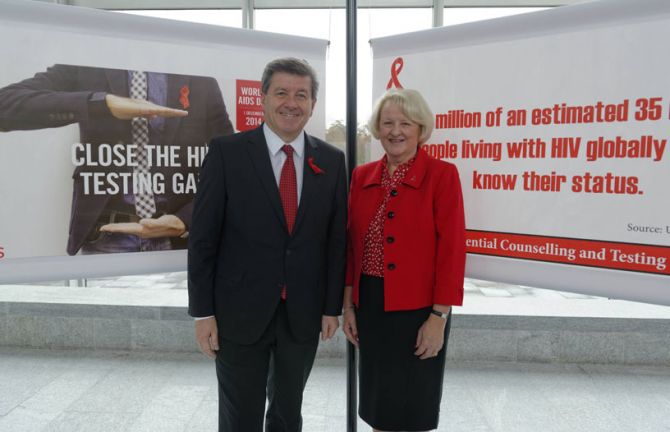
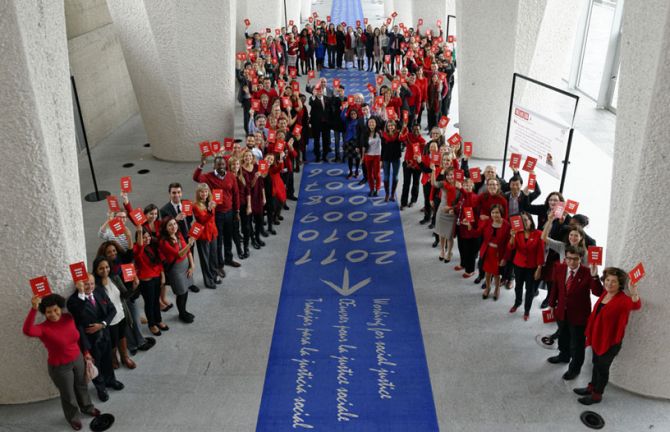
Update
ILO World AIDS Day campaign focuses on closing the gap in the workplace
01 December 2014
01 December 2014 01 December 2014UNAIDS Deputy Executive Director Jan Beagle participated, together with the Director-General of the International Labour Organization (ILO), in World AIDS Day commemorations at the ILO Headquarters in Geneva, Switzerland, on 1 December to highlight the importance of fast-tracking the AIDS response.
A focus of the ILO event was its VCT@Work campaign, which aims to reach 5 million workers with voluntary counselling and testing by 2015. Since its launch, the initiative has reached over 1 million workers and mobilized close to 500 000 people to undertake an HIV test.
As part its World AIDS Day commemoration, ILO staff formed a human red ribbon at ILO Headquarters in solidarity with people living with and affected by HIV worldwide.
Quotes
“At ILO you know best that the world of work provides unique entry points to close the gap and to reach some of the populations left behind in the AIDS response. Workplaces are communities with communication systems and health-care facilities that can be used for prevention, treatment, care and support services and to address stigma and discrimination.”
“We can only achieve our goal of ending AIDS by 2030 if we effectively address people’s needs, which include decent jobs, respect for their labour rights and social protection coverage.”
Related

Press Statement
Joint statement by UNAIDS International Goodwill Ambassadors
30 November 2014 30 November 2014Today on World AIDS Day 2014 we ask you to join us and speak out in solidarity with people living with and affected by HIV.
We have come such a long way—today new HIV infections are declining, better and simpler treatment is now available and people living with HIV are now living longer and healthier lives.
But significant challenges remain and we need to fast-track change.
We must close the gap between people who have access to HIV prevention and treatment and people who do not. We must close the gap between people with opportunities and people who are being left behind.
We want more results
We want to end the AIDS epidemic
We know that together we can do it
We are seeing remarkable progress, but we are not there yet
Gender inequalities, violations of human rights and even our own attitudes can leave people behind. People most affected by HIV often don’t have access to the HIV services they need. Stigma and discrimination drive people underground and away from lifesaving HIV prevention and treatment.
HIV is about people, communities and humanity. To end the AIDS epidemic we need change. We need to transform attitudes, improve health systems and respect human rights.
This is not a time to step back. This is the time to innovate, to close the gap and to make sure that everyone, everywhere has access to live-saving HIV services.
Support the work of UNAIDS
Annie Lennox, OBE
Naomi Watts
Michael Ballack
David Luiz
Aishwarya Rai Bachchan
Victoria Beckham
Myung-bo Hong
HRH Crown Princess Mette-Marit of Norway
Toumani Diabaté
HSH Princess Stéphanie of Monaco
Press centre
Download the printable version (PDF)
Documents
2014 World AIDS Day around the world
World AIDS Day is commemorated every year on 1st December. Here are some photos from across the globe capturing the spirit of this year’s events.
Related
2014 World AIDS Day around the world
05 December 2014
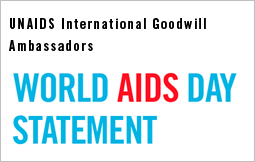 Joint statement by UNAIDS International Goodwill Ambassadors
Joint statement by UNAIDS International Goodwill Ambassadors

30 November 2014

